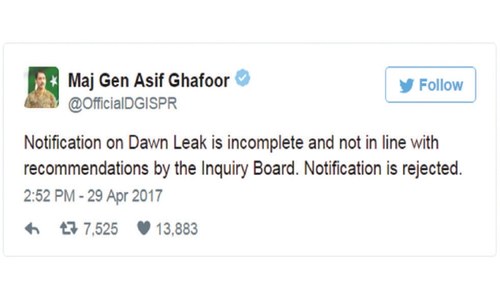What ought to have been the end of a destabilising period in civil-military ties has instead erupted into a fresh, unnecessary and undesirable crisis.
In the murky world of politics, facts about inter-institutional relations are often hard to come by, but a path forward had seemingly been found.
Nearly eight months since the publication of a report in this newspaper, an inquiry committee consisting of representatives of both civilian and military institutions produced a consensus report and a set of recommendations that were presented to Prime Minister Nawaz Sharif.
The government had publicly pledged to accept and implement the inquiry committee’s recommendations and it seemed the matter was about to come to a close. Perplexingly, the government appears to have mishandled the public announcement of the committee’s recommendations. Even more astonishingly, the military issued a stunning and public rebuke to the government.
Five months to the day since a new army chief assumed command, Prime Minister Sharif and army chief Gen Qamar Bajwa were at the centre of an instantaneous national storm.
Cooler heads must prevail from here, and for that both sides must acknowledge their mistakes and take steps to ensure they are not repeated.
For the government, making public the committee’s report and recommendations may help dispel the clouds of suspicion and mistrust. Beyond that, the government must realise that too many centres and too many conflicting messages are a recipe for instability or worse.
Even after the crisis erupted, Interior Minister Nisar Ali Khan’s news conference only added to the confusion. Indeed, at some point it appeared as if the interior minister were suggesting his ministry is administratively superior to instructions from the Prime Minister’s Office. Whatever the technicalities, the need at that moment was to bring clarity to the matter, not further obfuscation.
Surely, whatever the deficiencies in the government’s handling of the inquiry committee’s recommendations, the startling tweet by DG ISPR Maj-Gen Asif Ghafoor was a line that should not have been crossed for the sake of the system. It is inconceivable that the army chief could not have urgently and privately reached out to the prime minister to have the military’s reservations addressed quickly and publicly by the government.
It is also unlikely that the military leadership did not anticipate that the DG ISPR’s tweet would be interpreted nationally and internationally as a shot across the bow of democracy.
Shamefully, the political opposition in the country has leapt into the fray in a way that has put it on the wrong side of the democratic project. Urgent introspection is necessary for all sides.
Published in Dawn, May 1st, 2017


































